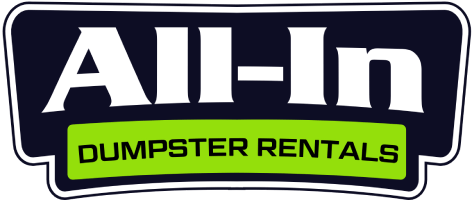Looking to reduce landfill costs on your construction site? Discover effective waste sorting methods that maximize recycling opportunities and improve your project’s sustainability.
Why Construction Waste Sorting Matters
Construction projects generate massive amounts of waste – approximately 600 million tons annually across the United States. For contractors and homeowners in Western North Carolina, proper waste management isn’t just an environmental concern; it directly impacts your bottom line. With landfill tipping fees continuously rising in the Asheville area, sorting your construction waste for recycling can significantly reduce disposal costs while supporting sustainable building practices. At All-In Dumpster Rentals, we’ve helped countless contractors transform their waste management approach from a necessary expense into a cost-saving strategy that enhances project efficiency. Additionally, we offer tailored residential waste removal options that cater to the specific needs of homeowners embarking on renovation or construction projects. By integrating these services with your waste management plan, you can ensure that all debris is handled responsibly and efficiently. This not only fosters a cleaner environment but also elevates the overall quality of your building project.
Common Types of Recyclable Construction Materials
Understanding what can be recycled is the first step toward effective construction waste management. Many materials from your job site have significant recycling potential:
Wood waste, including clean lumber, pallets, and engineered wood, can be processed into mulch, biomass fuel, or new wood products. Metal scraps like steel, aluminum, copper, and brass have high recycling value and are easily accepted at recycling facilities throughout Buncombe and Henderson counties. Concrete and masonry can be crushed and repurposed as aggregate for new concrete or as base material for roads and driveways. Cardboard packaging, which often accumulates quickly on job sites, can be recycled if kept clean and dry. Asphalt shingles can be processed into material for road construction or new roofing products.
By identifying these valuable materials before they hit your dumpster, you’re taking the first step toward meaningful waste reduction and cost savings. This proactive approach not only benefits the environment but also enhances your bottom line. By implementing a system for sorting and repurposing materials, you’re actively participating in transforming waste into valuable resources. Such initiatives can lead to innovative recycling solutions that further minimize landfill contributions and maximize sustainability efforts.
Practical Sorting Methods for Construction Sites
Effective waste sorting doesn’t need to complicate your construction process. With some advance planning, you can integrate efficient sorting methods that work with your existing workflow:
Start with a designated area for sorting with clearly labeled containers for different material types. This simple setup makes it easy for all workers to participate. Train your crew on proper sorting practices and why it matters—when everyone understands the benefits, compliance improves dramatically. Consider scheduling regular “clean-up times” throughout the project when teams focus specifically on proper waste sorting. This prevents recyclable materials from being hastily thrown into general waste during busy periods. Place sorting stations near where specific waste is generated—a small metals container near cutting areas, for example, improves compliance.
For larger projects in Asheville and surrounding areas, consider using multiple specialized dumpsters—one for clean wood waste, another for metals, and a third for mixed construction debris. All-In Dumpster Rentals can help you develop a customized waste management plan that fits your specific job site requirements.
Cost Benefits of Construction Waste Sorting
The financial advantages of proper waste sorting extend beyond reduced landfill fees. When you separate valuable materials like metals, you can often sell these to recyclers, generating additional revenue. Many recycling facilities in Western North Carolina charge significantly less for sorted materials compared to mixed waste, directly reducing your disposal costs. With proper planning, you might need fewer dumpster pickups throughout your project, saving on transportation costs. Additionally, many clients value sustainable building practices, potentially giving your business a competitive edge when bidding on environmentally conscious projects.
Overcoming Common Sorting Challenges
While the benefits are clear, construction waste sorting does present some challenges. Limited space on tight job sites in areas like downtown Asheville can make establishing sorting stations difficult. Weather conditions in Western North Carolina, particularly during rainy seasons, can complicate cardboard recycling. Mixed materials like insulation with paper backing or treated lumber require special handling considerations.
To overcome these challenges, start small by focusing on high-value recyclables like metals before expanding your sorting program. For weather concerns, consider using covered containers for materials that need to stay dry. When space is limited, prioritize sorting the highest-value materials first, and consider daily removal of sorted recyclables to maintain open workspace.
Ready to Maximize Your Construction Waste Recycling?
Let All-In Dumpster Rentals help you develop an efficient waste sorting system for your next construction project. As a local, family-owned company serving Asheville and surrounding areas, we understand the unique waste management challenges of Western North Carolina construction sites. Our team can help you select the right containers for your specific needs and connect you with local recycling resources that maximize the value of your sorted materials. We also offer commercial dumpster solutions for businesses, ensuring that you can efficiently manage waste while adhering to local regulations. Our commitment to sustainability means that we can help you reduce your environmental footprint by promoting recycling and responsible disposal practices. Trust us to streamline your waste management process, allowing you to focus on what you do best—completing your project.
Call us today at [phone number] for a free consultation on how to reduce your construction waste costs through smart sorting and recycling strategies. We’re available 7 days a week to answer your questions and help you build a more sustainable, cost-effective approach to construction waste management.
